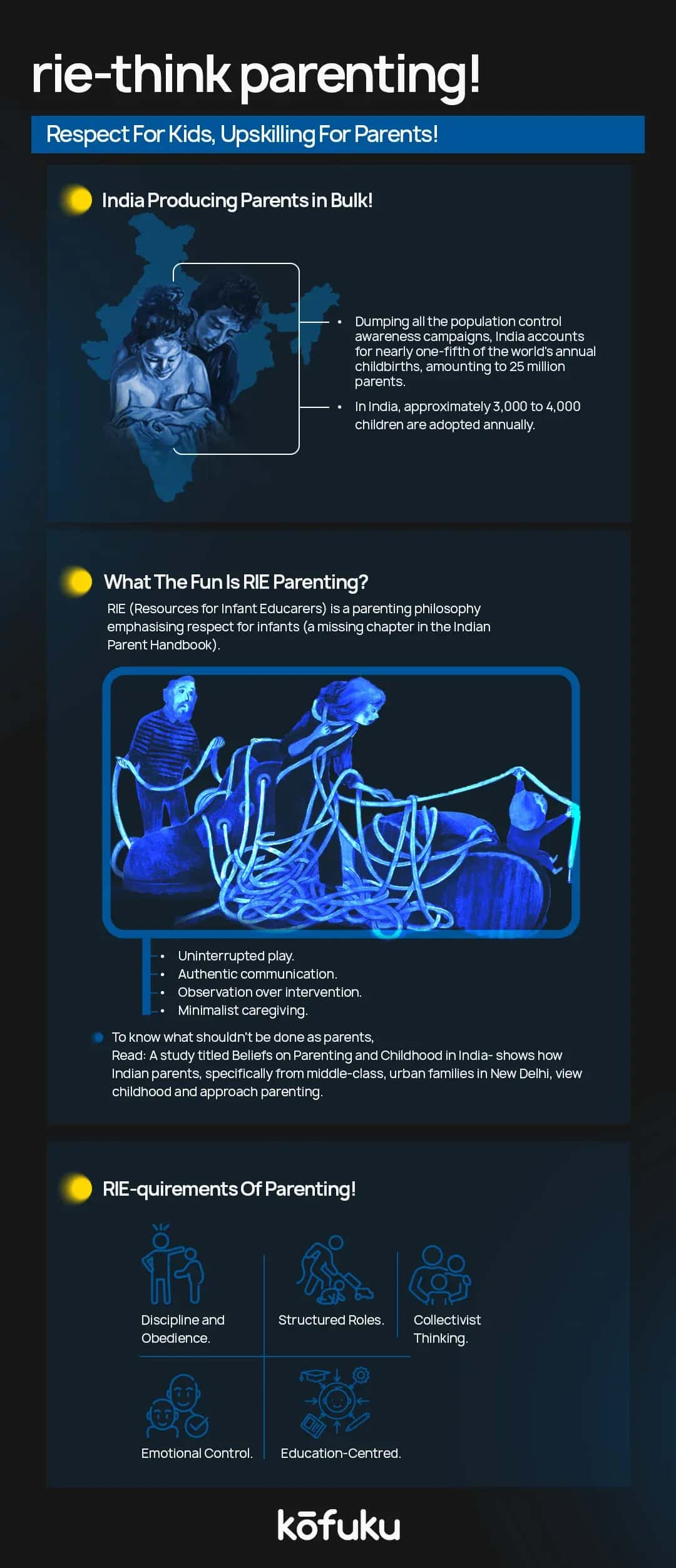What is RIE Parenting?

Introduction
There is a thin line between Indian parenting and physical abuse. If you are an Indian male, growing up was all about avoiding getting smacked. With a slipper, rolling pin, clothes hanger, bare hands, cleaning broom, mop, the list is endless. Mother would weaponise anything and everything, and once she caught hold of you, it was fair game.
Touch a child today, however, and you are in line for a lawsuit. Things have changed. Times have changed. Us, not so much.
Today, we have something called RIE parenting. For the uninitiated, RIE parenting stands for Resources for Infant Educarers. This approach is relatively new, founded in 1978 by Magda Gerber, a Hungarian immigrant and early childhood educator who lives in Los Angeles.
What in the world is an “Educarer”? Are We Coining Random Terms Now?
“Educarer” is a term that suggests parents and caregivers must respect even the tiniest infant. Gerber says babies should be treated as capable and comprehending of the world around them, assimilate, and thrive if provided space and freedom from too much adult direction.
The end game, with RIE, is to nurture what is commonly known as an “authentic child”. This means your little bundle of love should execute daily life feeling competent, secure, autonomous and connected to their environment.
How Do We Go About This?
Have you noticed that children who are granted some degree of autonomy and independence usually grow up as well-adjusted adults with a proper disposition, thankfully without any issues.
According to Gerber, there are many basic principles to RIE, but above all comes communication. Because without communication, nothing works. You have a “communication breakdown”. Just ask Led Zeppelin.
Well, with RIE, we communicate “authentically”, conversing in a normal adult voice to babies and children. With this dialogue, the aim is to
-
Show respect.
-
Communicate about real things that go on daily.
-
Acknowledge the responses, thoughts and feelings of the child.
This approach has potential, at least on paper. The thing is, everything that sounds great on paper somehow disappoints. That’s the way the world works, bro.
But hold on. Let’s not go cancelling RIE because it’s another method of raising children. You don’t need a new method for raising children because you’re a shitty parent. You need a new way to raise children because they must grow up and not use Chatgpt to communicate with their contemporaries.
RIE Ain’t Bad After All
The thing about RIE is that it’s multi-faceted. According to a parenting expert, it can be done, provided there’s proper communication, freedom, modelling, empathy and self-direction.
For instance, changing your child’s diaper? Give them a step-by-step explanation of what’s happening, or a play-by-play. It fosters understanding of the world. Being clear and concise helps with language skills. Tell them to raise their bottom or lift their legs.
Children learn by observation. As adults, it’s our responsibility to model the traits that we wish to see in them. Set an example - lead with kindness, respect, honesty, patience and some more.
For children also, they have to be free to express themselves, their thoughts, feelings and emotions. With babies, that means tears, tantrums and a fair amount of screaming.
There’s no screaming for you, but. You can’t belittle your kids either. You can’t emotionally blackmail them with “When I was your age, I would cross the Ganga, Brahmaputra and the Yangtze for Math's tuition.”
Hold on. So does that mean you can’t punish your child? When it comes to discipline, the RIE parenting method steers clear of punishment, at least not in the conventional sense.
Children crave empathy, not punishments and/or shaming. Instead of punishing them or shaming them, we have to comprehend the reason behind their actions.
Of course, there are boundaries. Parents following the RIE approach can always be strict disciplinarians. One tiny thing changes, though. Instead of punishments, your children receive consequences.
If your child exits the dinner table before finishing a meal, you clear their plate. They’ve made a choice - getting up prematurely, so they should live with the outcome. No food, or dinner.
What Else Can I Do as an RIE Parent?
Ensure a safe environment
This is sacrosanct. Fostering a home that’s safe for infants is extremely important. Your child should have a flexible environment, allowing for natural movements, sans too many restrictions.
Make sure there are toys and furniture, which is okay, in case your infant is left alone. Cordon off an area if it isn’t age-appropriate. They shouldn’t pose a threat. A safe play place should be exactly what it spells out - a safe play space.
Make sure there’s solo play
With RIE, the focus is on ensuring even the youngest infants have opportunities to play alone and be uninterrupted by caregivers. As a parent, all you need to do is sit back and marvel at what your baby is doing and learning through play.
RIE stresses simple and uncomplicated toys that permit open-ended play. For instance, wooden blocks beat overstimulating battery-operated toys any day. Start by sitting with the baby, giving them full attention.
After some time, move to a nearby space - like a kitchen, and let them carry on what they were doing.
Involve your child in their own care
What?!?!? It’s true! With RIE, you actually want your child to participate actively in things like bath time, feeding, and diaper changes. How can a baby lend you a hand? Well, for starters, clearly communicate.
If your baby is playing, tell them you want to change their diaper, then pick them up and take them to the changing table. Carry on with “Time to lose the pants, so we can change your diaper.” Followed by “I'm going to take off your diaper and wipe you clean”. And finally “Time for a clean diaper.”
Observe your child, understand their needs
The key is “sensitive observation”. As a caregiver, watch and listen to your infants and children to gauge their needs. That means less talking and directing and more silence and listening, dude.
Observation alone will teach you everything you need to know in the first two to three years of a child's life. According to RIE, most of a child's learning is self-directed, so parents can spend less time setting up learning opportunities and more time absorbing all the growth that their child does on their own.
If your child cries, so be it. Crying is communication. Tune into it and find out what the baby is trying to share.
And Finally - Be Consistent!
This is so important, we can’t stress enough. Making sure that a child’s environment, and day-to-day life, and communication is consistent, leads to the child feeling safe. Trying to put your child to sleep? Try coming up with a predictable pattern that you can follow each night. Babies thrive on routine. Give it to them.

What Are the Advantages of RIE Parenting?
What are the pros of this style of parenting? Many. Firstly, with this style, there isn’t any guilt, and parents can take care of their own needs. RIE can give you confidence in the boundaries that you set as a parent, like your personal needs. Want to go to the bathroom? By all means, please do.
RIE parenting takes the pressure off when it comes to constantly entertaining children 24/7. Tiny children are encouraged and expected to play on their own. You don’t have to be an entertainment CEO in your child’s life.
Best bit? Let your children decide the pace of their life for themselves. Don’t direct their activities. If they want to have a say, permit them. They’ll feel empowered, from a young age. Give them the autonomy to pick the things they want instead of being directed.
There Might be Some Disadvantages Though
The RIE approach is not the gold standard of parenting. Granted, RIE treats children as independent from birth. Does this mean they’re pushing them away from comfort?
Also, the idea might be outdated. Babies can self-soothe, but you have to teach them how to do it.
RIE has been termed generalising or “rigid” when it comes to play. Babies can be left on their backs to play, during waking hours. Some might like this, some might not.
Indian Parents - You Might Struggle with RIE
Relinquishing control is not something Indian parents do very well. Also, in case anyone hasn’t told you. You aren’t God. Or even a prophet, remotely. Stop expecting children to worship you. Why should they? Don’t you have any flaws?
As Indians, it’s ingrained so deeply in our psyche that “parents can do no wrong” or “parents are divine”. That’s just so wrong! Parents are human, with human errors that are obvious, even if they aren’t damaging.
Stop putting yourself on a pedestal just because you are a parent. It doesn’t mean that you are morally and emotionally pure. It just means you have a diaper to change.
Finally.....
The parenting style you choose for your baby is totally up to you. You could do RIE parenting, authoritarian parenting, authoritative parenting, permissive parenting or whatever else you want to do.
Parenting is a fine line between smothering a child and completely ignoring their existence. Find the middle ground and stick to it.
Be there for your child, but not so much that they start resenting your presence or your existence. Your child needs you, yes, but they don’t want you breathing down their neck, constantly telling them what to do. That’s unnecessary.

Conclusion
A child can give you a lot of chances to practise your parenting, get it right. Stay curious and watch and observe your children when they’re having strong emotions.
If RIE parenting sounds good, give it a shot. Begin by making sure your little one’s environment is safe - and then step back and look at it from a different perspective.
You might be surprised - your baby could teach you about needs and preferences - if only you would listen! Till then, go throw a few chappals at your kid, and see how many they can dodge, at the end of the day.
FAQs
Q. Is RIE parenting suitable for Indian families?
A. Yes, RIE parenting can work across cultures, including Indian families. While it may feel unfamiliar compared to traditional Indian parenting methods, the core values of respect, communication, and boundaries are universally beneficial.
Q. Can RIE parenting be combined with other parenting styles?
A. Absolutely. RIE isn’t all or nothing. Parents often combine elements of RIE with other approaches like authoritative parenting to create a balanced style.
Q. What age is best to start RIE parenting?
A. RIE can be introduced right from birth, but it’s never too late to adopt its principles.
Q. Doesn’t giving children too much autonomy spoil them?
A. Not necessarily. RIE teaches guided autonomy, not permissiveness. Children are given choices.
Q. How do I discipline my child without yelling or punishing?
A. RIE promotes natural consequences instead of punishments. For instance, if your child throws their toy, the consequence is losing access to it temporarily—not a timeout or scolding.


10 Ways of Reorienting With Respectful Parenting

Myths of Perfect Parenting – Don’t Fall for These Lies

Navigating Parenthood: Adoptive Parenting Tips

Parenting Advice: Why One-Size-Fits-All Doesn’t Work

Parenting Tips for Specially-Abled Kids & Support


